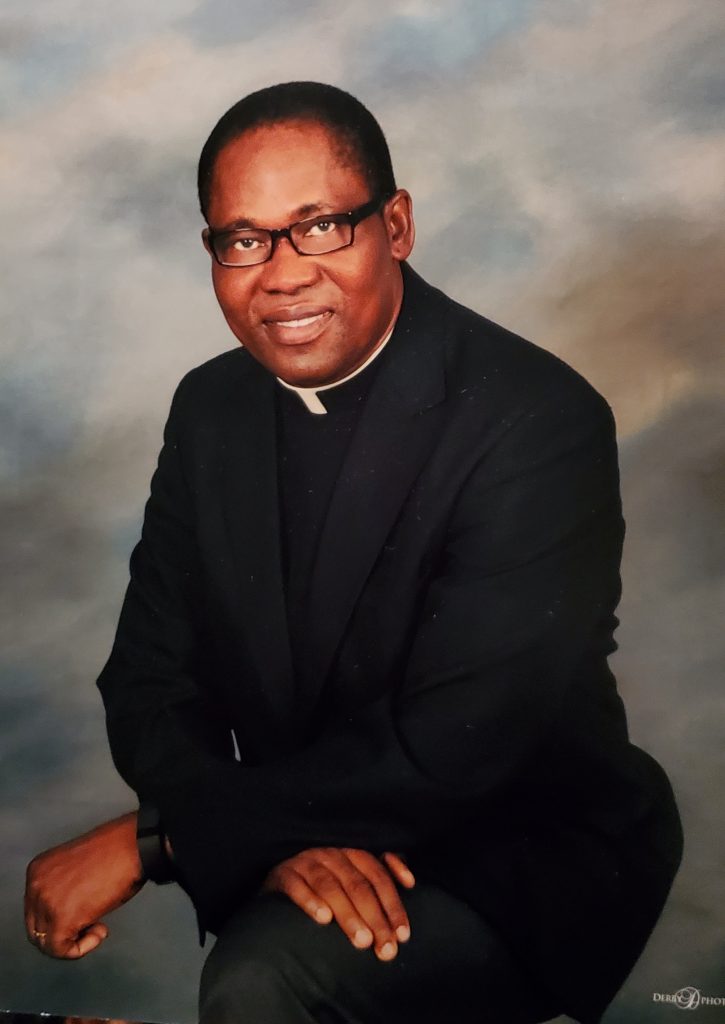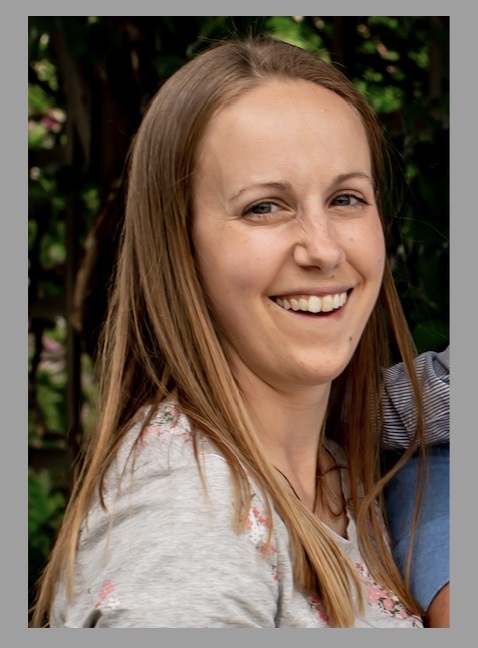May 9, 2023 // Diocese
Local Therapists See Their Faith as Integral to Their Practice
May is National Mental Health Awareness Month, making this an excellent time to reflect on how this health care fits into our lives as Catholics. In our area, we have a number of Catholic counselors who are passionate about their work in the counseling field and how it is inspired by their faith life.
 Father John Eze is the pastor at Queen of Peace Parish in Mishawaka and he is currently in the process of finishing up his graduate degree in mental health counseling at Indiana University in South Bend. Father Eze shared that ever since his seminary days, he has had a desire to learn more about clinical mental health counseling. However, this desire was put on hold for several years as he lived out his vocation in pastoral ministry in Nigeria, his home country. While he has been serving at Queen of Peace, the tug on his heart to learn more about counseling has continued.
Father John Eze is the pastor at Queen of Peace Parish in Mishawaka and he is currently in the process of finishing up his graduate degree in mental health counseling at Indiana University in South Bend. Father Eze shared that ever since his seminary days, he has had a desire to learn more about clinical mental health counseling. However, this desire was put on hold for several years as he lived out his vocation in pastoral ministry in Nigeria, his home country. While he has been serving at Queen of Peace, the tug on his heart to learn more about counseling has continued.
When he learned more about the program he is currently in, Father Eze approached Bishop Rhoades to ask for permission to enroll. He said that he is so grateful for all the support that Bishop Rhoades has shown him in allowing him and encouraging him to pursue this degree so that he can better serve the people of this diocese. Father Eze said, “I very much see my vocation as a priest and the counseling profession are very much in tandem. They are so connected.”
He said people often ask him what he will do once he is done with the program. He responds by saying how he is already seeing the impact of his studies and using what he has learned. “I am using the program to become a better listener, to understand the human condition, and to open my eyes to issues that can only be addressed through mental health counseling.”
Father Eze talked about how grateful he is to be in a diocese where the importance of mental health care is really understood and promoted. One example he gave was that the counseling department of Catholic Charities was invited by Bishop Rhoades to a diocesan meeting of the priests in order to teach the clergy about how and when to refer someone to a mental health professional. Father Eze emphasized how important this was and said, “There is some sin that may have underlying mental health origins, and if you keep addressing it only with spiritual advice, there is no way that wound will be healed. Then they will come back next week with the same sin. But if you help the person to go through healing by using mental health services, then he will be able to make changes.” This is one reason Father Eze said he feels it’s so important for priests to continue to be trained in the importance of mental health care and he is grateful to be able to serve as a resource for his brother priests.
When thinking about his vocation as a priest and his service in the counseling profession, Father Eze turns to Jesus as his model of a counselor. He said, “Look at the way Jesus encountered the woman at the well. Look at how He encountered Zaccheus. He didn’t tell Zaccheus to repent or that he was a sinner. He told him, ‘Come down. I will be with you.’ He showed compassion and empathy. The guy came down and said, ‘If I had defrauded any person, I will give four times back and from now on I will give half my property away to the poor.’ So, how did Jesus encounter him? People treated him as an outcast, but Jesus treated him with love, compassion, and empathy. And Zaccheus then made the choice to become who he became. I read the Gospels today with a mind of Jesus as a counselor. And I see Jesus encounter people in their brokenness and He encompasses all the skills that I should be bringing to my clients.”
Melissa Buddie is another counselor in the Michiana area who provides services through telehealth. Her current specialty is perinatal mental health, which consists of serving women who are considering conceiving, those struggling with infertility, those who have experienced miscarriage or infant loss, and women who are currently pregnant or who have recently given birth. Buddie also mentioned her view of Jesus as the first social worker and said that this really shaped her view of how she sees herself as a therapist. She said, “As a therapist, I approach each session saying, ‘God what do you want me to accomplish in this session?’ My clients come with what is on their mind and I come with my expertise, but also with what God wants us to focus on that day and accomplish. I rely on Him to give me the words, especially in those tough moments when there aren’t really earthly words to say to them that would be as perfect as you would like, and so I rely on God for that.”
Buddie talked about her passion for advocating for all people to feel comfortable accessing mental health care if they need it. She said, “There’s a lot of really hard things we encounter in our lives. As Catholics we understand that suffering is a part of that. However, we also do not need to sit in suffering unnecessarily. There is some suffering that we can get stuck in and this can really impact us and the people around us in a negative way. When we think about mental health care, it’s not just about us and our feelings, but it’s also about taking care of those around us as well as taking care of ourselves. In order to live our vocation, it’s important to have mental health care. In order to be able to be what God has asked us to be, we might need mental health care. Mental health care does not mean that there is something wrong with you or that you’ve failed in any way. It just means that there is a chemical imbalance in their brain or that they’ve experienced some really big event that their brain is having trouble coping with, and neither of those things make you a failure. So mental health care becomes really important in showing us the respect and dignity that God wants us to have and making sure we are able to be the best version of ourselves for everyone else in our lives.”
Buddie also encouraged people who might be hesitant to try therapy. “As the client, you are in control of the conversation. When you are sharing things that are so vulnerable, it can be helpful to remember that you are in control. No one can force you to talk about anything you don’t want to. Therapy is supposed to help you with the things you bring to it.”
Adam Smith is a therapist working at his own private practice in Mishawaka, Smith Counseling Services. He spoke about how he initially had a career in software consulting and transitioned to the counseling profession. “My wife suggested I start looking at other career options after I wore down her patience droning on about how empty my job felt. I fell in love with the vocation after volunteering with adolescents who were experiencing grief from losing a sibling or parent.”
Smith also emphasized the importance of relying on God in the counseling profession. He said, “I’ve also found myself profoundly humbled in this vocation. When confronted with trying to walk with someone through devastating loss or overwhelming stress, if I believed that their healing relied solely on my expertise, I would be having panic attacks of my own in sessions. Trusting that I am doing my best to be a conduit for God’s love and healing allows me to work with a greater freedom and confidence knowing that our time together is just a medium for God’s greater work in that person’s life.”
For those hesitant to try counseling, Smith wants Catholics to know that all therapists are bound by the code of ethics to respect the faith lives of their clients. He remarked, “I have worked with individuals who have waited more than a year to see Catholic or Christian therapists due to limited availability. I often hear concerns of people fearing that their spirituality would be rejected or they would be given recommendations for interventions that run counter to their faith. Therapists are trained to adhere to a strict code of ethics in order to protect clients in these situations, where the beliefs or potential biases of a counselor should never be projected onto their clients. While there are certainly examples of counselors failing to live up to this expectation, I would strongly encourage anyone who is uncertain if they can wait to see ‘the perfect therapist’ to give a chance to other options if their needs are urgent. If a counselor is doing their job, they should help you feel safe and understood regardless if they share your exact beliefs.”
The best news. Delivered to your inbox.
Subscribe to our mailing list today.








